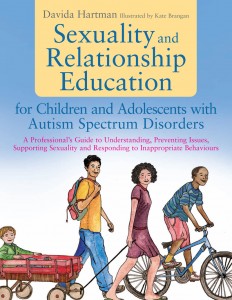 In this interview Davida Hartman, senior educational psychologist and first time author provides an insight into why she wrote her new book, Sexuality and Relationship Education for Children and Adolescents with Autism Spectrum Disorders and her hopes for teachers and students who take part in the programme.
In this interview Davida Hartman, senior educational psychologist and first time author provides an insight into why she wrote her new book, Sexuality and Relationship Education for Children and Adolescents with Autism Spectrum Disorders and her hopes for teachers and students who take part in the programme.
What experience motivated you to write this book?
It was a number of experiences really. I have always found it deeply saddening that, despite the perception that they are uninterested in interacting, many people on the spectrum desperately want to experience meaningful relationships and yet find themselves isolated and lonely because they are at a loss as to how to actually go about it.
I have also seen just how distressing challenging behaviours in this area can be for parents and how, when they occur in schools, they are so quickly escalated to crisis stage. These behaviours often lead to even further isolation for the child, largely because of a lack of understanding of the typical sexual development of children and how this may be expressed in someone with difficulties in social understanding. And it is such a pity, because so many of these behaviours can be avoided (or at the least greatly ameliorated) by good, respectful, preventative work in the area of sexuality and relationships.
I had already designed an evidence based parent and professional training programme which I was presenting regularly in my professional practice and I realised that it would lend itself well to a book which would have the benefit of reaching far more people.
Are there common obstacles that professionals come across when teaching their students with ASD about sexuality and relationships?
Yes, so many.But these are largely around actually getting the programme going in the first place. The sad fact is that the majority of typically developing children don’t receive Sexuality and Relationship Education to meet their needs, and there are even greater societal barriers to it being provided to children with special needs.
One of these barriers is the belief that people with disabilities are, or should be, sexless, or conversely would become ‘oversexed’ if given the opportunity. This has led historically to a denial of their basic human right to sexuality. For anyone wanting to learn more about this power imbalance and how to change it for the better, I could not recommend enough David Hingsburger’s book ‘Just Say Know.’
A real life example of these barriers at work is the automatic assumption by many special educators that any sexual behaviour should be punished and eliminated, instead of the student being supported to understand and express their feelings in socially appropriate ways.
What do you hope students will take from your programme?
I would love for them to take away a confidence and belief in themselves, their bodies and their abilities. To be able to make informed, independent decisions about their own sexuality, to recognise signs of abuse and have steps to take when they do recognise it and to enjoy healthy relationships on their own terms.
What is the most important piece of advice you have for teachers tackling this subject?
To start from a place of kindness, empathy and respect, even, in fact especially, when working with children with severely challenging behaviours. To reflect on how important relationships and sexuality have been in their own lives and to remember how much power they have over their student’s lives in terms of the skills they choose to teach, or indeed not to teach. To remember that although they may be doing it in atypical ways, these children are expressing feelings and desires that are normal. And to also make sure to extend this kindness, empathy and respect to parents who are often doing the very best that they can under exceptionally difficult circumstances.
Where can teachers find additional materials to support them with this subject?
Actually, since I had so much difficulty finding suitable resources in this area myself in the past, I set up my own website www.autismsexeducation.com so that what I had researched would be easily accessible to others. On it, I’ve reviewed books and resources for both parents and professionals and I’ve only included those that I think are good, or at least interesting. I also have a Facebook page and Twitter account which I keep updated with new resources and findings as I come across them and a blog called Autism Sex Education www.autismsexeducation.wordpress.com.
Davida Hartman is the author of Sexuality and Relationship Education for Children and Adolescents with Autism Spectrum Disorders (2013) published by Jessica Kingsley Publishers.
I really appreciate this type of information. Thanks for sharing helpful information.